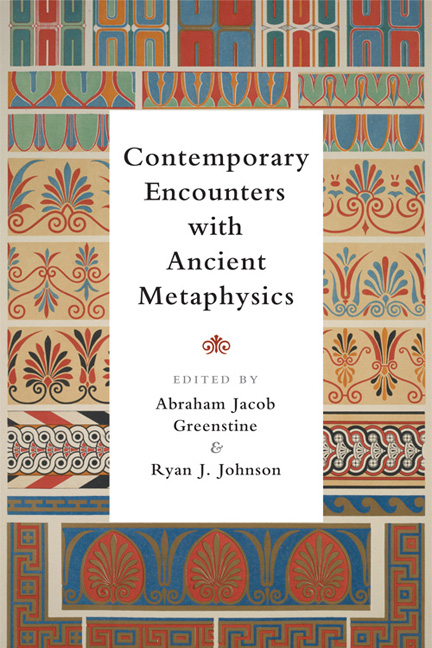Book contents
- Frontmatter
- Contents
- Acknowledgements
- Note on the Text
- Notes on Contributors
- 1 A Thousand Antiquities
- Part I Plato
- Part II Aristotle
- 7 Science Regained [1962]
- 8 Aristotle's Organism, and Ours
- 9 Does It Matter? Material Nature and Vital Heat in Aristotle's Biology
- 10 The Modern Aristotle: Michael Polanyi's Search for Truth against Nihilism
- 11 Diverging Ways: On the Trajectories of Ontology in Parmenides, Aristotle, and Deleuze
- 12 Object and Οὐσία: Harman and Aristotle on the Being of Things
- Part III Epicureans, Stoics, Skeptics, and Neo-Platonists
- Part IV Postscript
- Index
7 - Science Regained [1962]
from Part II - Aristotle
- Frontmatter
- Contents
- Acknowledgements
- Note on the Text
- Notes on Contributors
- 1 A Thousand Antiquities
- Part I Plato
- Part II Aristotle
- 7 Science Regained [1962]
- 8 Aristotle's Organism, and Ours
- 9 Does It Matter? Material Nature and Vital Heat in Aristotle's Biology
- 10 The Modern Aristotle: Michael Polanyi's Search for Truth against Nihilism
- 11 Diverging Ways: On the Trajectories of Ontology in Parmenides, Aristotle, and Deleuze
- 12 Object and Οὐσία: Harman and Aristotle on the Being of Things
- Part III Epicureans, Stoics, Skeptics, and Neo-Platonists
- Part IV Postscript
- Index
Summary
Εἶναι καὶ ἐνταῦθα θεούς.
The previous chapters’ conclusions may seem negative: the science without name, to which editors and commentators will give the ambiguous title Metaphysics, seems to oscillate without end between an inaccessible theology and an ontology incapable of tearing itself away from dispersion. On the one hand, an object too distant; on the other, a reality too close. On the one hand, a God ineffable since, immutable and one, he escapes from the grasp of a thought that divides that of which it speaks; on the other, a being that, insofar as it is in motion, escapes, through its contingency, from a thought that speaks only in order to compose that which is divided. The two projects of Aristotle – the one a unitary discourse about being, the other a first and thereby foundational discourse – each seem to result in failure.
But if we analyze the causes of this failure, of which all that has survived under the name Metaphysics is only the meticulous description, we realize that the case of theology and the case of the one discourse about being (what we have called ontology) are, in reality, neither identical nor even parallel. The human incapacity [L'impossibilité humaine] for theology is not Aristotle's own discovery; Plato himself had suspected it in the first part of the Parmenides, by recovering [retrouvant] the profound sense of the old Greek wisdom of limits: one must not try to search, human that one is, to know that which is beyond the human. But, in Aristotle, the impossibility of a theology is not only encountered and recorded; it is progressively justified, and this justification of the impossibility of theology paradoxically becomes the substitute for theology itself. The impossibility of thinking God outside of movement leads to the theory of the unmoved First Mover. The impossibility of applying to God the human experience of thinking, that is to say the thought of another object, leads to the definition of God as Thought that thinks itself. More often, however, this impossibility is not counterbalanced, or rather is not concealed, under the form of apparently positive affirmations.
- Type
- Chapter
- Information
- Contemporary Encounters with Ancient Metaphysics , pp. 119 - 137Publisher: Edinburgh University PressPrint publication year: 2017



